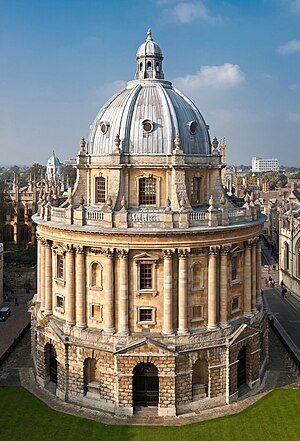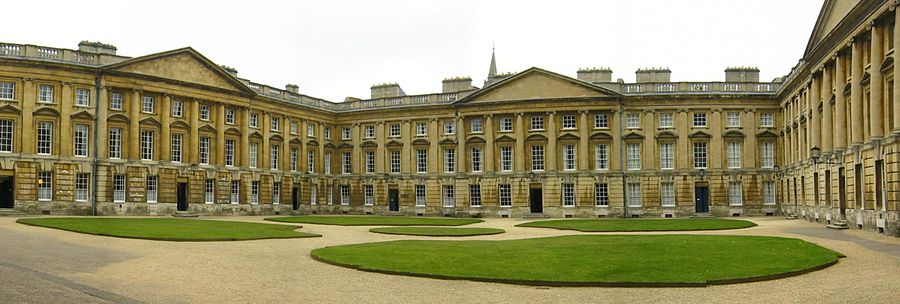| Main page | Indices | Projects |
The University of Oxford portal
The University of Oxford is a collegiate research university in Oxford, United Kingdom. There is evidence of teaching as early as 1096, making it the oldest university in the English-speaking world and the world's second-oldest university in continuous operation. It grew rapidly from 1167, when Henry II banned English students from attending the University of Paris. After disputes between students and Oxford townsfolk in 1209, some academics fled north-east to Cambridge where they established what became the University of Cambridge. The two English ancient universities share many common features and are jointly referred to as Oxbridge.
The University of Oxford is made up of 43 colleges, consisting of 36 semi-autonomous constituent colleges, four permanent private halls and three societies (colleges that are departments of the university, without their own royal charter), and a range of academic departments which are organised into four divisions. Each college is a self-governing institution within the university, controlling its own membership and having its own internal structure and activities. All students are members of a college. The university does not have a main campus, but its buildings and facilities are scattered throughout the city centre. Undergraduate teaching at Oxford consists of lectures, small-group tutorials at the colleges and halls, seminars, laboratory work and occasionally further tutorials provided by the central university faculties and departments. Postgraduate teaching is provided in a predominantly centralised fashion.
Oxford operates the Ashmolean Museum, the world's oldest university museum; Oxford University Press, the largest university press in the world; and the largest academic library system nationwide. In the fiscal year ending 31 July 2023, the university had a total consolidated income of £2.92 billion, of which £789 million was from research grants and contracts.
Oxford has educated a wide range of notable alumni, including 30 prime ministers of the United Kingdom and many heads of state and government around the world. 73 Nobel Prize laureates, 4 Fields Medalists, and 6 Turing Award winners have matriculated, worked, or held visiting fellowships at the University of Oxford, while its alumni have won 160 Olympic medals. Oxford is the home of numerous scholarships, including the Rhodes Scholarship, one of the oldest international graduate scholarship programmes. (Full article...)
Selected article
The first Honorary Fellows of Keble College, Oxford, were elected in 1931, when the college's governing body was given power to elect "distinguished persons" to this position. Under the current statutes of the college, Honorary Fellows cannot vote at meetings of the Governing Body and do not receive financial reward, but they receive "such other privileges as the Governing Body may determine." Those elected have included college alumni (for example, the Pakistan cricketer and politician Imran Khan, elected 1988), benefactors (for example Sir Anthony O'Reilly, elected 2002), and individuals of distinction without academic links to the college such as former U.S. President Ronald Reagan (pictured) (elected 1994) and the poet Sir John Betjeman (elected 1972). The three longest-serving Honorary Fellows are Sir John Forsdyke (Principal Librarian of the British Museum; appointed 1937, died 1979), Sir Thomas Armstrong (conductor; appointed 1955, died 1994) and Harry Carpenter (Warden of Keble, later Bishop of Oxford; appointed 1960, died 1993). (Full article...)
Selected biography
Selected college or hall
Campion Hall is one of the Permanent Private Halls (PPHs) of the University of Oxford. Unlike the colleges, which are run by their Fellows, PPHs are run by an outside institution – in the case of Campion Hall, the Society of Jesus. One of the smallest constituent institutions of the university, it named after the martyr St. Edmund Campion, who was a Fellow of St John's. Established in 1896 as "Clarke's Hall" as a hall for Jesuit undergraduates, it went through various changes of name as the Master in charge changed, until it achieved permanent status in 1918 and took its current name. Its building on Brewer Street, completed in 1936, was designed by Sir Edwin Lutyens – his only Oxford building. The exterior has been compared to 17th-century Cotswold architecture, and the chapel light fittings have red tassels like those on a cardinal's hat. Jesuit clergy, and priests of other Roman Catholic orders, are admitted to study; laymen are sometimes admitted. Alumni include the poet and writer Peter Levi, the priest and English literature scholar Peter Milward, and the priest and historian Peter L'Estrange (who later became Master of Campion Hall). (Full article...)
Selected image

Did you know
Articles from Wikipedia's "Did You Know" archives about the university and people associated with it:
- ... that John Prideaux Lightfoot commissioned the Adoration of the Magi tapestry (detail pictured) from Morris & Co. for the Gothic revival chapel at Exeter College, but died before it was completed?
- ... that special trains were laid on for voters returning to Oxford for the 1860 election of the Boden Professor of Sanskrit?
- ... that William Morfill was the first professor of Russian in Britain?
- ...that a scathing obituary of British author Lord Michael Pratt in The Daily Telegraph called him "an unabashed snob and social interloper on a grand scale", who habitually outstayed his welcome?
- ... that one 16th-century Registrar of the University of Oxford was dismissed after neglecting his duties for a year, then imprisoned and fined after throwing a punch when the debate had ended?
Selected quotation
Selected panorama
On this day
Events for 4 July relating to the university, its colleges, academics and alumni. College affiliations are marked in brackets.
|
Births
|
Deaths
|
Wikimedia
The following Wikimedia Foundation sister projects provide more on this subject:
-
Commons
Free media repository -
Wikibooks
Free textbooks and manuals -
Wikidata
Free knowledge base -
Wikinews
Free-content news -
Wikiquote
Collection of quotations -
Wikisource
Free-content library -
Wikiversity
Free learning tools -
Wikivoyage
Free travel guide -
Wiktionary
Dictionary and thesaurus














